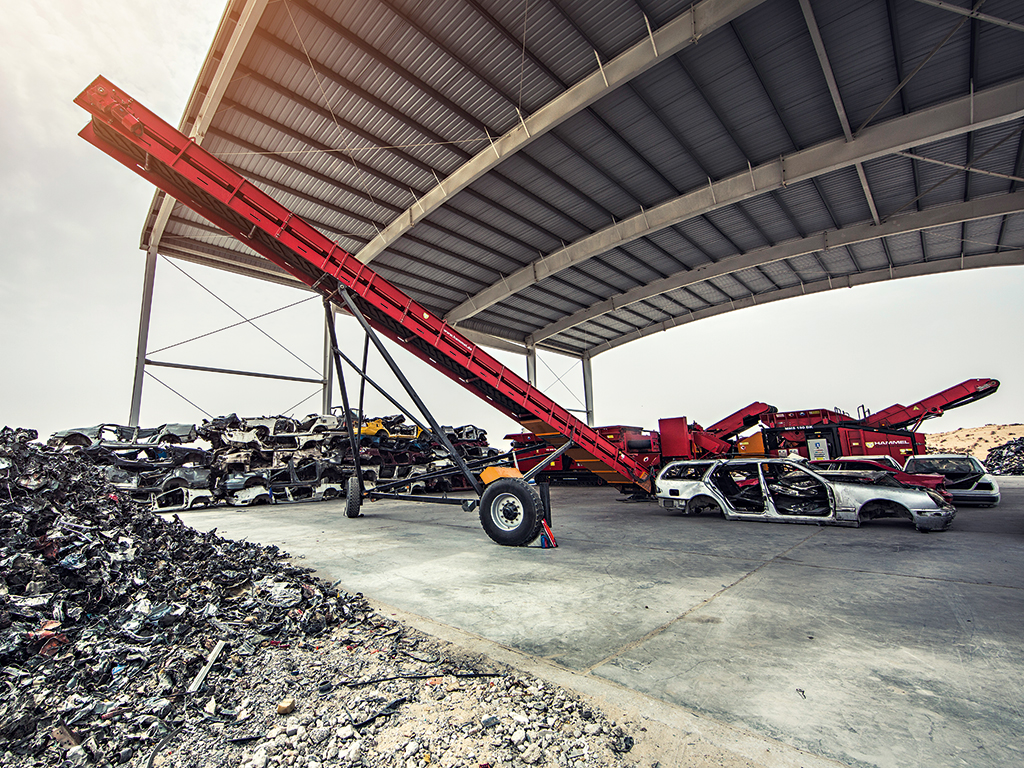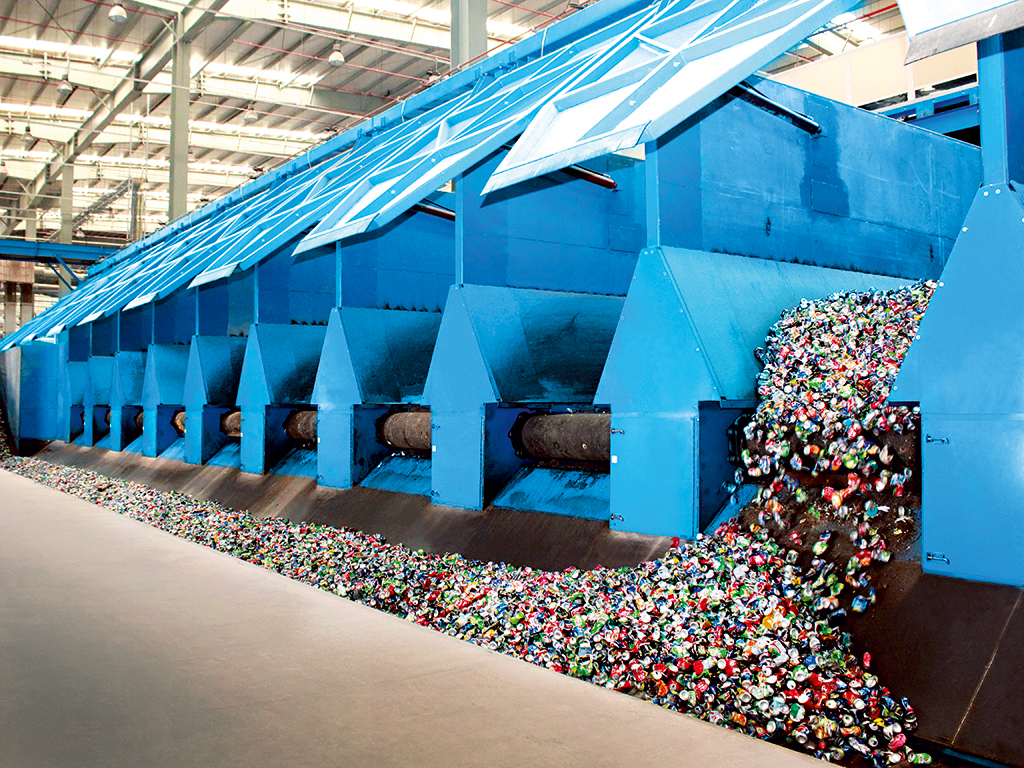Pioneering sustainability in the UAE; Bee’ah advises
Khaled Al Huraimel, Group Chief Executive Officer of Bee’ah, explains how the company’s waste management schemes are pioneering environmental sustainability in the UAE

Bee’ah’s Car and Metal Shredding Facility turns unwanted vehicles into valuable raw materials
Waste management has become a high priority in the United Arab Emirates due to rising migration and consumption levels. This has prompted Bee’ah, an environmental and waste management company in the city of Sharjah, to lead the charge in recycling by setting an ambitious ‘Zero Waste to Landfill’ target, which would make Sharjah the first environmentally responsible city in the Middle East and one of the most responsible in the world.
Waste management objectives are never without substantial challenges – particularly in the context of the Middle East. Bee’ah has identified ‘source segregation’ as the main priority to effectively achieve our Zero Waste goal in Sharjah so that less waste ends up in landfills. This is due to the estimated 70 percent of waste generated in Sharjah that can be recycled (composed of 40 percent dry recyclables and 30 percent organic material).
For this reason, it is of vital importance that our community is well informed about the methods and benefits of separating their waste so most of it can be recycled at Bee’ah’s Material Recovery Facility (MRF). This is the largest waste-sorting plant in the Middle East and the third-largest in the world, with a total annual capacity of up to 500,000 tonnes of recyclable waste.
Through proper segregation, waste management and recovery systems, much of the waste that is produced from our community can be recovered for composting and recycling. That includes paper, plastic bottles, and aluminium and steel cans. Indeed, most of the waste generated contains valuable recyclables that could be processed and successfully re-used in our economy.
70%
of waste in Sharjah can be recycled
As a country that has consistently ranked high in terms of waste per capita, the failure to segregate has resulted in the UAE economy losing around AED1.5bn ($408m) every year. Educating and informing the public about proper waste management and recycling methods is all about closing the loop, and preventing and reducing further unnecessary wastage.
If you can turn garbage into new raw materials, it creates a much more efficient and prosperous economy. Due to the UAE’s lack of natural resources, the challenge of developing infrastructure and awareness, and introducing regulations is very important to long-term sustainable success.
The cost of inaction
Waste management in the Gulf Cooperation Council countries comes under the responsibility of municipalities, most of which have general regulations and rules for the management and disposal of solid waste, along with programmes to reduce the amount of the solid waste generated. Right now in the UAE, you can see the infrastructure being built and businesses showing support for the Sharjah Municipality’s successful efforts to raise public awareness and increase recycling. But our regulations need to be accompanied with public awareness, cultural change and physical activity if we are to achieve Zero Waste to Landfill.
The regulatory challenges we face in this waste management objective are inconsequential when compared to the future impact of taking no action at all. For instance, it takes almost 400 years for a plastic bottle to naturally degrade if it ends up in landfill: given the average person in the UAE is responsible for approximately 350 to 450 bottles of water going to waste every year, this represents an enormous environmental tragedy. The UAE is one of the highest consumers of bottled water globally, so the local bottled water manufacturing industry could save millions of bottles and vastly increase its revenue by using recycled raw materials to produce new bottles. Furthermore, recycling plastic products requires 20 to 40 percent less energy than manufacturing new ones and, as the international community has demonstrated, recycling can save the wider economy millions of dollars in resource and energy expenditure.
Encouraging people to recycle is a long road and the journey has only just begun in the United Arab Emirates. Bee’ah is just eight years old and has already managed to implement the required facilities and awareness to successfully encourage measurable recycling in Sharjah: there has been an increasing level of consciousness and, as a result, there has been exponential growth in the number of plastic bottles arriving at Bee’ah’s facilities.
Successes to date
Our experience to date has been that, whenever we provide recycling facilities, people do use them. Having said that, Bee’ah has also introduced important education and recycling initiatives to accelerate the waste management progress: Bee’ah has been implementing residential recycling initiatives in residential communities across Sharjah and will be rolling them out in more residential areas of Sharjah over the next year; and Bee’ah has just concluded the fourth academic year of the Bee’ah School of Environment initiative, which educates 164,000 students in 206 schools annually, with the aim of reaching out to even more students and teachers next year.
After launching residential recycling within some of Sharjah’s sectors in 2012 and achieving 70 percent progress towards Zero-Waste to Landfill in Sharjah in 2014, Bee’ah has begun plans to launch residential recycling across all sectors within the city. We are extremely confident that, by providing the right tools and infrastructure, Bee’ah will help our community lead environmental change for many years to come and will fully accomplish our waste management goals.
The whole aim of recycling is to turn what is now waste into valuable raw materials for industry to use; this creates jobs in the UAE and substantially reduces the need for imported materials. We are all trained to look at recycling from an environmental and an economic viewpoint. The environmental benefits are obvious: a good recycling programme in the UAE would save hundreds of millions of tonnes of resources every year. By recycling, we are also capturing valuable resources and feeding it back into the economy of the UAE.

The next challenge
The next challenge for Bee’ah in reaching its Zero Waste target is tackling the remaining 30 percent of waste that is unrecyclable. To do so, Bee’ah is building the region’s first, and the world’s largest, advanced thermal waste-to-energy facility, utilising state-of-the-art gasification technology. The waste-to-energy plant will recycle 400,000 tons of non-recyclable waste annually, generating 85MW of clean green energy. This facility, valued at £300m, will be built next to the Bee’ah waste management centre in partnership with Chinook Sciences, a UK-based research group that supports nuclear, metal and industrial gas industries.
Bee’ah is confident the spread of waste management through education and awareness programmes throughout Sharjah will continue to encourage recycling and lead an environmentally sustainable emirate. Ultimately, waste management in the United Arab Emirates relies on our efforts to continue developing our waste management programmes’ capacities, and on our residents reducing the amount of waste generated by implementing the three Rs: reduce, re-use and recycle. This strategy not only decreases the size of Sharjah’s landfills but also ensures an environmentally sustainable and clean emirate as it moves ever closer to the ambitious Zero Waste to Landfill target.













